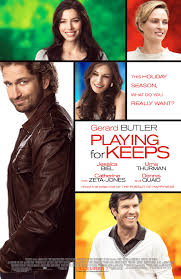In a world where sports often intertwine with the complexities of life, this film serves as a compelling reminder of the sacrifices made for love, ambition, and the quest for redemption. Playing for Keeps, released in 2012, stars Gerard Butler as George, Jessica Biel as Stacie, and Uma Thurman as a love interest in George’s life. Set in suburban America, the film straddles the line between romantic comedy and heartfelt drama, providing a unique perspective on fatherhood and personal growth through the lens of a former soccer player turned stay-at-home dad.
The plot revolves around George, a former professional soccer player who returns to his hometown, struggling to reconnect with his estranged wife, Stacie, and their son, Lewis. As George attempts to mend his relationship with his family, he inadvertently becomes involved with the local youth soccer team, where he meets a variety of eccentric mothers. The narrative deftly explores George’s journey of self-discovery as he faces the challenges of being a father, grapples with his past mistakes, and learns the importance of commitment and sacrifice. The film effectively captures the emotional nuances of parenting and the impact of second chances, making it a relatable tale for anyone who has navigated the complexities of relationships.
One of the standout elements of the film is the acting, particularly Gerard Butler’s performance as George. He brings a charismatic yet vulnerable quality to the character, effectively portraying George’s internal struggles and growth. Butler’s ability to balance comedic moments with heartfelt scenes adds depth to the film, allowing audiences to empathize with his journey. Jessica Biel complements Butler’s performance beautifully, portraying Stacie as a loving yet conflicted mother trying to find her own path. Their chemistry feels genuine, making their on-screen relationship believable and engaging. The supporting cast, including Uma Thurman and Catherine Zeta-Jones, adds further richness to the story, with each character bringing their unique perspective on love and parenting.
Direction plays a crucial role in how the film unfolds, with Gabriele Muccino at the helm. He effectively weaves together the comedic and dramatic elements, ensuring a well-paced narrative that keeps viewers invested. The direction successfully highlights the charm of suburban life while delving into the deeper themes of love and personal growth. The film’s tone strikes a balance between lighthearted fun and poignant moments, creating an engaging viewing experience. The well-executed editing keeps the storyline moving forward, ensuring that audiences remain connected to the characters’ evolving relationships.
The cinematography captures the picturesque suburban settings beautifully, creating a warm and inviting atmosphere that mirrors the film’s themes of family and love. The camera work emphasizes the emotional moments, drawing viewers into George’s internal struggles while highlighting the warmth of family dynamics. The visual storytelling enhances the narrative, making the film feel intimate and relatable. Each scene feels carefully crafted to evoke specific emotions, ensuring that the audience can engage with the characters’ journeys on a deeper level.
Musically, the film features an eclectic soundtrack that complements its themes and emotional beats. The music is carefully chosen, enhancing the overall mood and underscoring the moments of joy, sorrow, and introspection. From upbeat tracks during the soccer matches to more reflective pieces during emotional exchanges, the soundtrack effectively supports the film’s narrative, enriching the viewing experience. The use of music adds an additional layer of connection to the characters, making their experiences resonate with viewers.
While Playing for Keeps excels in many areas, it does have its predictable moments that may feel familiar to fans of romantic comedies. Some plot points may follow conventional tropes, which could detract from the originality of the story. However, the film’s ability to capture the emotional complexities of love and fatherhood compensates for these minor shortcomings. The engaging performances and relatable dialogue keep the audience invested in George’s journey, making it a worthwhile experience.
In conclusion, Playing for Keeps is a charming exploration of love, family, and second chances that effectively blends humor and heart. With strong performances from Gerard and Jessica, the film creates a relatable narrative that resonates with audiences. The direction balances comedic and emotional moments beautifully, while the cinematography and music enhance the overall experience, making it visually appealing and engaging. Although it may lean into some predictable tropes, its charm and heartfelt moments make it a delightful watch for anyone seeking a light-hearted film with depth. For fans of romantic comedies, this film comes highly recommended—perfect for a cozy movie night with friends or a reflective evening spent exploring the complexities of love and family. Expect to laugh, reflect, and perhaps even shed a tear as you experience George’s heartfelt journey toward redemption and connection.







